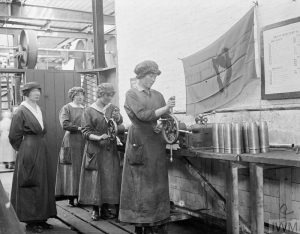Many years ago, I asked a work colleague what prompted his interest in the Great War. He said that he had become aware of how much the world had changed in those four years. The map of Europe had been redrawn. The social changes were even more dramatic. Things could never return to the old ways. It is possible to argue that the winds of change were already blowing. Undoubtedly some changes were already underway. The War accelerated many changes. It also delayed others. For example, the campaign for women’s suffrage was put on hold by the organisers. As ever, the situation in Ireland provides an interesting perspective.
At the very least (I am trying not to take a position at this point!), pressure for greater autonomy for Ireland had been growing for a long time. Some people were passionately in favour. Others were equally determined to retain the status quo. For quite different reasons, both factions supported war against Germany. Those with dreams of independence were appalled by the treatment meted out on ‘little’ Belgium by their much larger neighbour. Before the Great Famine, the population of Ireland was about 50% larger than that of Belgium. By the time that the Great War started, the population balance had switched the other way. But sympathy for the underdog would have remained strong. Those who saw their future firmly tied to the British Empire rushed to demonstrate their loyalty to King and Country.
The contribution of the soldiers from Ireland was covered in ‘Irish soldiers’. In addition, there were nurses and volunteers who went to the front. What happened on the Home Front? I am sure that many others are far more qualified to comment than me. I will content myself with a few snapshots.
In order to replace the men serving overseas, women were employed as clerks, cooks and farm workers etc. This trend seems to have been less marked in deeply conservative Ireland than was the case in England.
There were 37,000 people involved in shipbuilding in Belfast. They played a vital role in replacing losses caused by enemy actions.
Shells and cordite (the propellant used in shells) were made in Arklow, County Wicklow in a factory owned by Kynoch’s of Birmingham. At one time, the factory employed up to 5,000 people, many of them women.

There were state munitions factories in Cork, Galway, Dublin and Waterford. The factory in Dublin produced over half a million shells.
The Great Southern and Western Railway Company made over 1 million fuses.
The news on the employment front was not all positive. Factories making luxury items such as fine linen cut their workforces, at least initially. They argued, correctly, that demand for such products on the home market would fall. Furthermore, many export markets were affected by trade embargos. (No Irish tablecloths sold in Vienna or Berlin!) Government contracts, for items such as uniforms, helped to fill the shortfall in demand.
Looking back, it is easy to see the changes. I am not convinced that people were so aware of how the world had altered when they were living through it. Parallels can be drawn about the way the world has been affected by the coronavirus pandemic. A series of small, and some not so small changes have made for a different world in a relatively short period.
